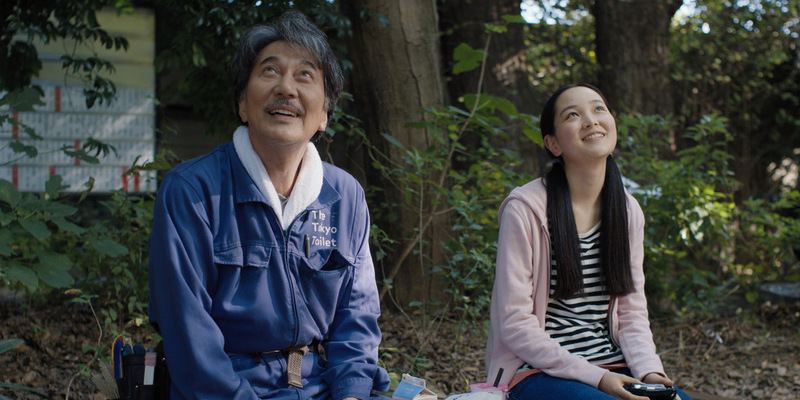
Review by
Eric Hillis
Directed by: Wim Wenders
Starring: Kōji Yakusho, Tokio Emoto, Arisa Nakano, Aoi Yamada, Yumi Asō, Sayuri Ishikawa, Tomokazu Miura

There's an unconfirmed anecdote about how when Yuri Gagarin became the
first man in space his jubilation at looking down at our planet from a
vantage point no other man had ever reached was disrupted by an irksome
ticking sound. It seemed to be coming from the spacecraft's complex
control panel, but after taking it apart Gagarin was unable to locate
the source of the sound, which was becoming increasingly annoying. How
could he spend weeks in a tiny cabin without this noise driving him mad
like the guilty protagonist of an Edgar Allan Poe story? Gagarin decided
he would simply find a way to live with the noise, to make it as
unnoticeable as the beating of his heart. And so he did.
If you don't have Gagarin's mindset, a routine can drive you mad. If,
on the other hand, you accept that every day will be pretty much the
same as the previous or the next, you ironically start to notice the
minute disruptions to the pattern, and these small changes become things
of beauty.
In Wayne Wang's Smoke, Harvey Keitel's shopkeeper takes a photograph of the same Brooklyn
street corner each morning. It might seem like a pointless endeavour,
but when another character is brought to tears after seeing his late
wife in one of the photos, we realise that monotony is a false concept
created by boring people. There is beauty in patterns. You just have to
look. In the modern world we spend a lot of time staring and not enough
time looking. We rarely look up because we're too arrogantly certain of
what's above us. We can't see the heavens for the clouds.

One man who looks and sees and understands is Hirayama (Koji Yakusho, best known to western audiences for his role in 1996's
Shall We Dance, a film that kickstarted a turn of the century revival of interest in
Japanese cinema), the protagonist of Wim Wenders'
Perfect Days. Following the lead of his compatriot and contemporary Werner Herzog's
Family Romance, LLC, Wenders has opted for Tokyo as the setting of his latest drama. The
film began gestating when the German filmmaker was invited to observe a
project that saw several of Tokyo's public toilets redesigned as art
pieces. Rather than making the expected corporate documentary, Wenders
teamed up with Japanese screenwriter Takuma Takasaki to devise a
film based around a man whose job it is to clean such facilities.
It's hard to think of an occupation looked down upon as much as that of
a toilet cleaner. It's the sort of potential career parents and teachers
use to scare teenagers into getting good grades. Negative assumptions
are made about the sort of people who clean toilets. In the west the
role is usually occupied by immigrants. You might worry that a movie
whose protagonist occupies such a position will inevitably fall into the
category of poverty porn, but Wenders has no such intent. Hirayama's job
is irrelevant; he might just as easily be donning a shirt and tie and
toiling in an office all day. He probably didn't envision toilet
cleaning as his career, but he's found a way to live with it, and that
way is to take pride in his work.
It helps that Hirayama is so receptive to the world's beauty. He wakes
in the morning not with groans but with a smile. He rolls up his
mattress and places it in the corner of his modest apartment, waters his
plants and dons his uniform, a blue jumpsuit, draping a towel around his
shoulders as though he's an athlete heading out into the pre-dawn world
for some early training. As he drives from one public toilet to another
he listens to his collection of cassettes. He's likely heard each one
hundreds of times, but the expression on his face when the guitar chord
of The Animals' The House of the Rising Sun strikes up gives the
impression of a teenager discovering rock music for the first time. When
a horny young co-worker, Takashi (Tokio Emoto), insists he co-opt
Hirayama's van to drive his stripper girlfriend to her place of work,
she hears Patti Smith's 'Redondo Beach' for the first time, and falls in
love so much that she steals the cassette, later returning it when she
realises she has no idea how to play it.

Hirayama's philosophy of appreciating the world for what it gives
rather than for what you can take from it is contrasted with Takashi.
Upon discovering Hirayama's collection of cassettes, his immediate
reaction is to ask what they might be worth. He doesn't mean what
they're worth to Hirayama, but what their market price might be, and he
tries to convince Hirayama to sell them in order to fund his dating.
Takashi is the sort who knows the price of everything and the value of
nothing. Hirayama sees value in everything. For Hirayama, life is an
ongoing transaction that always leaves him with enough spare
change.
The idea of taking joy in the smallest of interruptions to patterns is
conveyed through Hirayama's daily routine of observing the subtle shifts
in the canopy of his favourite tree. Like Keitel in Smoke, he takes a photo of the tree from the same vantage point each day
with a film camera. As he later sorts through the developed photos he
tears some up and places the others in one of two containers. A random
observer might struggle to tell the difference between which photo goes
in which box, but Hirayama knows. In his sleep he even dreams about the
tree, as though its branches were tickling his conscience. When he
discovers a sprout at the base of the tree he gently plucks it and takes
it home, appreciative of nature's unspoken offering.

If a man looks up as often as Hirayama does, he'll regrettably
occasionally see someone looking down on him. While the film never
judges Hirayama's station in life, some of the supporting figures that
drift through the film inevitably do, like the mother who wipes her lost
child's hands after he's been lead by the hand of Hirayama. When
Hirayama's troubled teenage niece stays with him for a few days after
falling out with her mother, we're offered hints of a more comfortable
life he left behind. When Hiroyama's estranged sister (Yumi Aso)
shows up in a chauffeur driven car to retrieve her daughter she's
clearly uncomfortable in her brother's presence. "Do you really clean
toilets?" she asks. Hiroyama doesn't respond verbally but we see the
hurt the question has caused. He's not ashamed of the answer, but the
question stings nonetheless, like when people ask why you're not married
or why you don't have kids; there's no pint giving an answer because
they really just want to ask the question. Society has developed narrow
parameters for what constitutes happiness, contentment and
fulfilment.
Perfect Days may refuse to look down on its protagonist,
but it doesn't whitewash the nature of his work. Not to get into
national stereotypes but if I had to clean toilets in any global city,
Tokyo would be pretty high on my list of preferences. That said, we're
left in no doubt that it's demanding physical labour. When Hirayama is
forced to pull a double shift due to an absent co-worker, we see him
grow frustrated at how he's been treated. The angry voice message he
leaves with his employer is the most vociferous he gets in the whole
movie. That Hirayama is able to stand up for himself in this way makes
us reevaluate his taciturn responses to most of the people he meets.
Hirayama could argue the case for his life, but why bother? People have
already made their mind up about him. Those who watch Wenders' film
may think about how they view those they consider "worse off," and might
start noticing the beauty of the non-material world. Wenders offers you
a perfect two hours. What you make of the other 22 in your day is up to
you.


